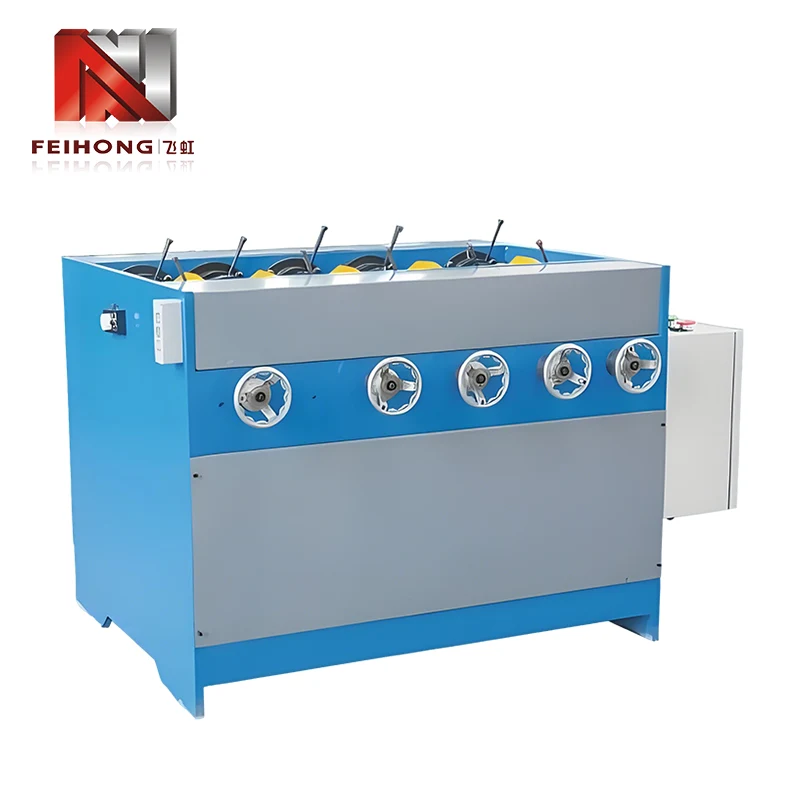Pipe Straightening Machines: An Essential Tool in Various Industries
2025-06-23
Pipe straightening machines are specialized devices used to straighten pipes, tubes, and other cylindrical metal components that may have been bent or deformed during manufacturing, transportation, or installation. These machines are critical in ensuring that pipes meet the required specifications, providing both aesthetic and functional benefits. The versatility of pipe straightening machines makes them indispensable in various industries, such as construction, manufacturing, energy, and plumbing. This essay delves into the significance of pipe straightening machines, their applications, and their advantages in modern industrial processes.
Working Principle of Pipe Straightening Machines
Pipe straightening machines typically consist of rollers, a feed mechanism, and an adjustable pressure system. The process involves feeding a bent or deformed pipe into the machine, where it passes through a series of rollers that apply controlled pressure to straighten the pipe. The rollers are designed to gradually remove any bends or curves, restoring the pipe’s original cylindrical shape. The degree of straightening can be adjusted depending on the type and extent of deformation.
The machine operates through mechanical or hydraulic means to exert pressure on the pipe, ensuring that it is straightened with precision. Some machines may also incorporate automated systems to monitor the straightening process, ensuring consistent results and minimizing human error.
Applications Across Industries
Construction and Infrastructure:
In the construction sector, pipes are used in a wide variety of applications, including plumbing, water supply systems, sewage lines, and gas pipelines. Pipe straightening machines ensure that the pipes used in these systems are free of distortions that could cause leaks or other issues during installation. Additionally, the machines help maintain the structural integrity of pipes, which is critical for ensuring the safety and efficiency of the entire system.
Manufacturing:
In manufacturing, particularly in the production of metal pipes for industrial applications, straightening machines are essential for ensuring that pipes are uniform in shape and size. Pipes used in industries like automotive, aerospace, and heavy machinery need to adhere to tight specifications. A pipe that is even slightly deformed could cause operational inefficiencies or failure. Pipe straightening machines help in maintaining the quality and precision required for such high-performance systems.
Oil and Gas:
In the oil and gas industry, pipes are crucial for transporting liquids and gases under high pressure. These pipes must be free from any deformities to avoid issues such as blockages, ruptures, or leaks. Straightening machines play a key role in preparing pipes for safe use, ensuring they can withstand the stresses of high-pressure environments. Additionally, they contribute to the seamless joining of pipes, an essential factor in maintaining the integrity of long pipeline systems.
Plumbing:
In plumbing systems, especially in residential or commercial buildings, pipes must be correctly aligned to facilitate the smooth flow of water or gas. Any irregularity in the pipe's shape could result in blockages, poor water flow, or leaks. By utilizing pipe straightening machines, plumbers can ensure that the pipes fit together perfectly and function as intended.

Automotive Industry:
In automotive manufacturing, pipes are used for exhaust systems, fuel lines, and air conditioning systems. Straightening machines are crucial for ensuring that these pipes maintain their strength and form, particularly in parts that need to endure high pressures or temperatures. The precision offered by these machines ensures that all components fit correctly within the vehicle’s design, contributing to both safety and efficiency.
Advantages of Pipe Straightening Machines
Enhanced Precision and Consistency:
One of the primary advantages of pipe straightening machines is their ability to provide precise and consistent results. Human error can often lead to uneven straightening, but with automated or semi-automated pipe straightening machines, the process is much more reliable and accurate. This precision helps ensure that pipes are within the necessary tolerances, which is crucial in industries where small deviations can lead to significant problems.
Improved Efficiency:
Straightening pipes manually is labor-intensive and time-consuming. Pipe straightening machines automate much of this process, drastically reducing the amount of time required to straighten large volumes of pipes. This increased efficiency leads to cost savings and faster production cycles, enabling industries to meet demanding timelines and improve overall productivity.
Reduction in Material Waste:
Deformed pipes that are not straightened properly could potentially be discarded, resulting in material waste. Pipe straightening machines allow for the reuse of bent pipes, saving costs and reducing the environmental impact. Straightening machines can handle a wide range of pipe sizes and materials, making it easier to correct deformities and avoid unnecessary wastage.
Improved Durability and Performance:
Straight pipes are less prone to wear and tear compared to bent or deformed pipes. Straightened pipes ensure better performance in high-stress environments, such as those found in the oil and gas or manufacturing industries. By removing bends and irregularities, straightening machines help enhance the lifespan and durability of the pipes, reducing the likelihood of maintenance issues.
Flexibility and Versatility:
Pipe straightening machines can handle a wide variety of pipe materials, including steel, aluminum, and copper, and can accommodate different pipe diameters and wall thicknesses. This versatility makes them valuable assets for companies dealing with a diverse range of piping requirements.
Conclusion
Pipe straightening machines are indispensable tools in a wide range of industries. Their ability to restore pipes to their original shape with precision, efficiency, and consistency makes them a key component of modern manufacturing, construction, and maintenance processes. By improving the quality of pipes, reducing waste, and enhancing overall system performance, these machines play a critical role in ensuring that industries can meet their operational goals with minimal downtime and maximum reliability.
As a professional manufacturer and supplier, we provide high-quality products. If you are interested in our products or have any questions, please feel free to contact us.